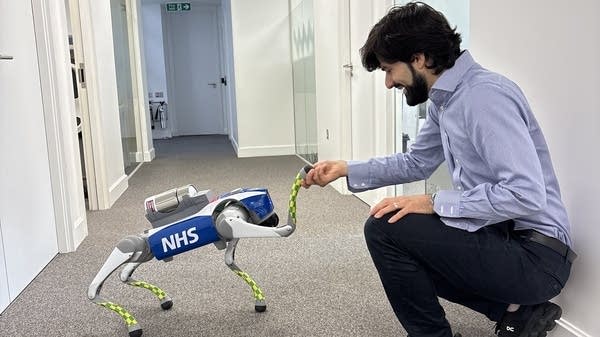How one engineer encouraged her company to make life easier for working moms
When Joanne Hislop had triplets, her employer allowed her to work part-time. But that wasn’t the end of her story.

Seven years into her career, senior medical device engineer Joanne Hislop received life-changing news: she and her husband were having triplets.
“They did an ultrasound, and pretty quickly were like, ‘Oh my gosh.’ And just kept asking if we were going to pass out,” she said.
She knew that balancing work and motherhood would be tough, but didn’t know exactly what that would look like with three babies.
“My career was a big part of who I was, and I had always intended to continue working,” she said. “But there was also so much unknown from the health side that neither one outweighed the other.”
At the time, Hislop was working for a company called Merit Medical, which makes products for heart surgeries, catheter tubing, and other medical devices.
It has about 7,300 employees, including 2,200 in Utah, where the company is headquartered.
Utah’s unemployment rate is unusually tight. The unemployment rate in the state is a full percentage point lower than the nation as a whole.
According to one study published in Behavioral Sciences, about 24% of new mothers in the United States exit the labor market in their first year of motherhood.
So when Hisplop told Fred Lampropoulos, Merit Medical’s CEO, about her changing family situation, he said he worried about losing a valuable employee.
“I thought, ‘Oh boy, we’re going to lose one of our best engineers,’” he said.
“I kind of expected, I think, at that point, that [the company] would just write me off,” said Hislop. “But he from the very beginning, was just really supportive and said, whatever we need to do to get you to come back.”
At the time, what she needed was flexibility. Her babies were born early and spent months in the hospital. She wound up taking a full year of maternity leave. When she did return to work, it was part-time. Her team worked around her schedule for years as she slowly ramped back up.
“Whatever you wanna do, we’re going to accommodate it,” Lampropoulos said.
But Hislop knew that despite the fact that she’d worked out this flexible arrangement with Merit Medical, there was a larger problem yet to be solved.
According to the Women's Society for Engineers, just 17% of U.S engineers are female.
“I had seen several female engineers who had been here for a long time, and then they just get to a certain point, start their families, and just would leave the industry,” said Hislop.
In Utah, the women’s labor force participation rate drops around age 25, which is when many women in the state start having children.
So, Hislop took that anecdotal data she’d gathered about women leaving the industry to her boss, CEO Fred Lampropoulos.
“And his response was, ‘Yeah, if there's anybody like that, just bring them to me,’” she said. “And so, for about six months, I kind of operated that way, where I felt like it's OK, it's my responsibility to keep my eye out for people like this.”
But Hisplop found that even when she talked to expecting mothers about how the company had worked with her? “It didn't matter,” she said. “They would leave anyway. And what finally clicked in my head was if we wait until they're pretty well going out on maternity leave, they've already made their decision a lot of times.”
Hislop said that’s when she realized that the company needed a formal program. “We needed to send a message to the employees that this is something they could ask for,” she said.
Lampropoulos agreed. With Hislop’s help, the company launched an official program last year — an institutional system — designed to make work more flexible for parents.
They’ve hired two people so far: both moms, working part-time.
“I would love for companies to see this as a community problem and not a problem for mothers,” Hislop said. “That they wouldn't feel as obligated to choose and have to leave one thing completely behind.”
Joanne Hislop, now a mom of four, has recently been promoted by Merit Medical. She’s also pursuing an Executive MBA on the company’s dime. She said her team is working around her schedule, so that she has time to do that.
Correction (July 1, 2025): A previous version of this story had a transcription error in a quote.
This story was reported as part of the “Marketplace” series, “The Age of Work,” about how changing labor force demographics are shaking up the global economy.













